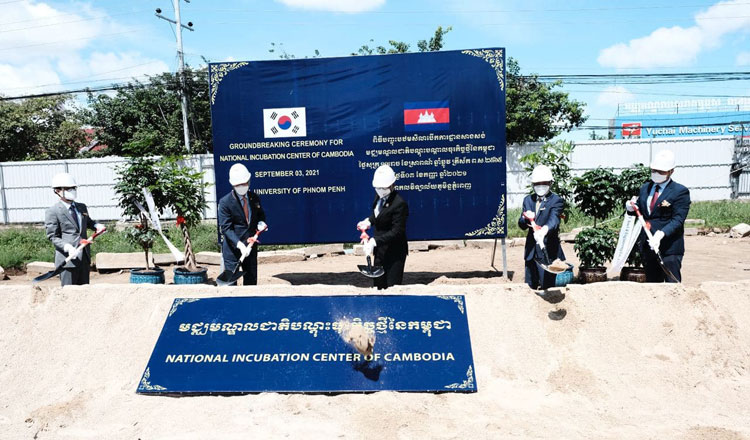Local entrepreneurs told: Focus on digital ventures for funding
 RUPP’S rector, KOICA’s country director, Cambodia’s education minister and the ambassador of South Korea at the ground-breaking ceremony for the National Incubation Center of Cambodia. KT/Michael Firn
RUPP’S rector, KOICA’s country director, Cambodia’s education minister and the ambassador of South Korea at the ground-breaking ceremony for the National Incubation Center of Cambodia. KT/Michael Firn
Cambodia’s young entrepreneurs need to be tech savvy and develop cutting-edge mobile applications if they want to attract the venture capital firms currently eyeing Southeast-Asia for investment opportunities, according to investors and incubators. Experts say local and national government and higher education institutes also need to play their part.
The region’s tech firms had a combined valuation of $340 billion last year, which is likely to grow to $1 trillion by 2025, according to venture capital company Jungle Ventures. Much of that money is heading to the region’s biggest economies, where successful tech startups have built their businesses with venture capital and are now going public. Indonesia saw its largest listing in a decade when e-commerce firm Bukalapak.com raised $1.5 billion. Singapore-based ride-hailing, food delivery and mobile payment company Grab plans a US listing later this year. It postponed its July initial public offering after it agreed to a reverse acquisition with Altimeter Growth Corp at a valuation of approximately $40 billion. The Cambodian and South Korean governments are working together to help young entrepreneurs by pumping $8 billion into the National Incubation Center of Cambodia (NICC) which is being built at the Royal University of Phnom Penh. University Rector Chet Chealy says Cambodia can learn from South Korea’s expertise in information and communications technology (ICT). “We train our young entrepreneurs to start their own businesses and we incubate them for some time before we let them go to the world of work completely. I hope that Korea will work with us in the field of ICT because they are very advanced in that field so they will work together to think what kind of apps they need for the new situation in this country,” he said. South Korean Ambassador Park Heung-kyeong said his country stands to benefit from sharing its experience of rapidly improving, with the two countries poised to sign a free trade agreement as early as next month. “Korea has a long experience in economic development. We have moved from a developing to a developed country so we are willing to fill the gap between developing and developed countries and to help developing countries move to the next stage. I think this incubation centre will do a lot for helping the cause of developing countries,” he said at Friday’s ground-breaking ceremony.
According to the Asian Vision Institute policy brief “Creating a Tech Startup Ecosystem in Cambodia” the main barriers for startups in Cambodia are incomplete institutional arrangement, access to funding, lack of specific policy access to talent, access to expert/mentor and access to prototyping laboratories. It recommended that Cambodia set up: “Functional institutions to oversee and synergise roles and responsibilities of key actors; formulate startup policy specific to the desideratum of a national innovation ecosystem; launch a national scholarship scheme to ensure high-quality graduates at flagship universities with seed-funding for startup, co-create a university business incubator to foster research commercialisation, formulate a tech-transfer programme for frugal innovation and incentivise small and medium enterprises toward its maturity for tech-absorption from R&D [research and development] at the university.”
The director of the Centre for Inclusive Digital Economy at the AVI said: “The National Incubation Center of Cambodia will play a key role in supporting the startup ecosystem in Cambodia by promoting university-industry linkage, as well as connecting potential investors with local entrepreneurs. More importantly, the NICC will provide a crucial platform for the young and driven entrepreneurs of Cambodia to grow and flourish,” Chhem Siriwat said.
The Asia Development Bank’s country director Cambodia said entrepreneurs who focus digital business ventures on the domestic economy can benefit from easy access to the internet here but Sunniya Durrani-Jamal said the Kingdom’s big telecoms companies need to do more to improve infrastructure. “Cambodia already accomplished several key achievements through the enhancement of broadband network coverage, as reflected by the growth of domestic subscriptions of mobile internet connection. Mobile network coverage is almost nationwide, of which the 4G services are still being expanded in coverage, in line with the growth of subscribers. The broadband network already has wide coverage with large subscriptions especially in the municipality and cities, but the service quality is still a major issue. Schools, hospitals, public transit systems, public security and administration systems are yet to be linked to the digital systems and the majority of the domestic industrial base is not yet digitally connected… supporting the transition into Industry 4.0.” Khmer Times






